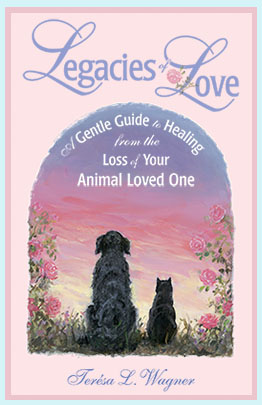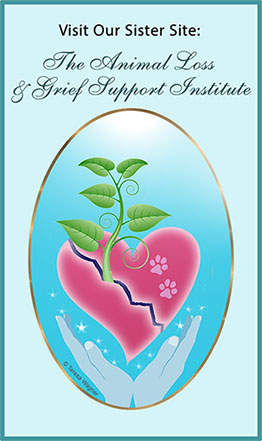Pet Loss Support Groups:
Start Up, Structure & Effective Facilitation

|
LENGTH: |
4 1/2 hours total |
|---|---|
|
OFFERED |
This is an on-demand teleclass to take anytime, at your convenience.
|
|
COST: |
$112 which includes: |
|
PURCHASE: |
To purchase click here For those enrolled in the Animal Loss and Grief Support Training and Certification Program this class is an elective. To see more classes in the program, click here. |
|
INSTRUCTORS: |
Enid Traisman, MSW, CT, CFS & Donna Kahora, RN |
|
WHO SHOULD ATTEND:
|
Anyone who is interested in gaining the information and skill to start and effectively facilitate a pet loss support group. It may also be valuable as a review to those who currently facilitate support groups. |
CONTENT AND PURPOSE:
Attending a well led pet loss support group is a very comforting and validating experience. Being surrounded by others who understand the grief over a companion animal on a heart felt level can bring a sense of both safety and not beling alone and making it possible to share the important story of one's animal and their loss. Such sharing with others who understand helps diminish grief and facilitates healing.
To an onlooker, an effective support group may appear to be seamlessly led by the facilitator, with each participant being fully heard and supported, and with differences amongst members' stories and values being validated and respectfully honored. For this to occur, however, the facilitator needs to fully understand, cultivate and carefully apply specific skills to insure that every participant feels safe, listened to, respected, and has ample opportunity to openly share without judgement or imposed advice from others. Skilled facilitators know how to deal with disruptions, challenges and problems that arise with grace and ease.
This class has been designed to help those interested in becoming pet loss support group facilitators to:
- Understand the purpose and scope of grief support groups and how they are different from therapy groups, therapy and workshops
- Become aware of how to find sponsors, participants and space for grief support groups
- Learn the purpose of structuring support groups and how to do so in ways that maximize participant emotional safety, learning and growth
- Understand group dynamics, learn the specific skills of expressing empathy and interventions needed for effective group facilitation
- Become familiar with a wide array additional resources:
- Resources to continue facilitator learning and skill building
- Resources to share with your support group members for their continued healing and growth
The outline of content covered in the class includes:
The Purpose and Scope of Pet Loss Grief Support Groups
- Expectations of what can be accomplished and what cannot
- The difference between a support group, a therapy group, one on one counseling, and a workshop
- Understanding scope of practice; knowing when to refer & having therapist resources ready for referral
Finding Sponsors, Participants and Space
- Finding an organization sponsor for a group (if needed or desired)
- Locating appropriate space for a group; seating arrangements
- Advertising and attracting participants
- Charging for group attendance or facilitating as a volunteer
How to Structure Support Groups
- Open for drop ins? Closed except to those signed up?
- Schedule: Ongoing or held for a finite period of time
- Frequency of meetings: every week, twice a month, once a month?
- Length of meetings: an hour? 90 minutes? 2 hours?
- Ground rules and boundaries for support groups
- Format: Just sharing? Or include some rituals, exercises, activities or educational materials?
Skills and Knowledge Needed to Effectively Facilitate a Grief Support Group
- Two Golden Rules of Grief Support: Empathy Before Strategy; Do Not Impose
- Understanding group dynamics: What can go wrong and how to keep a group on track and harmonious
- Qualities and responsibilities of an effective support group facilitator
- Acknowledging and Active Listening
- Empathic questioning to gain clarity
- Gatekeeping
- Appropriate use of self disclosure
- Effective interventions for challenges and problems: difficult or disruptive group members; shy, introverted group members; those who take up too much air time; when a member may sob uncontrollably and seem to be falling apart; when members are angry or rude with other members
- Handling Major Differences in Values and Beliefs: Between members and when the values or way of dealing with grief of a member is quite different from the facilitator's
- The Difference between offering resources as suggestions to consider (whether tangible such as books or ideas on how to reframe an issue causing pain) and being overly directive or imposing our values and beliefs onto members
The handouts are priceless. Thank you for taking the time to make them so detailed and complete. The class materials and presentation were superb. I'm very glad I took the course. What I liked most were the exercises and examples from real people and real life situations. And thank you, Teresa, for offering this class at this special price. Thank you, Enid and Donna, for providing this service and support to grieving souls. Donna, what a wonderful tribute to [your dog] Nikki. Thank you all for your time and wisdom.
~ Evelyn G, Bahama, North Carolina
Since I am already helping to facilitate groups, I understand much of the dynamics presented, and thought it was a wonderful overview - well presented and well thought out. But I also learned a lot more than I was expecting. The different group formats of the two instructors was very helpful, allowing us to see some similarities and differences in groups set-up and dynamics.
Handouts were extremely valuable. I am a very visual person, and seeing the written work is essential for my learning style. I am a copious note-taker for this reason. So I found is incredibly helpful to have most of the note taking done, allowing me time to listen carefully and jot a few notes along with those in front of me.
What I liked most was Teresa's beautiful voice! It was my first teleclass, and I was actually very impressed with the entire thing. Loved the ability to be in my home environment and still feel the group presence.
Again, it was wonderful to have three perspectives - sometimes in perfect sync, and sometimes presenting differences in experience and group dynamics. As I mentioned, I could listen to Teresa all day - very soothing, very embracing, very calming presence you are! And, of course, I have the utmost admiration for Enid - she is my human inspiration for this work. And it was lovely to meet Donna and gain some very valuable information - a lot of time and energy went in to the formation of FON and I thank you for sharing!
~ Debbie C, Portland, Oregon
Excellent information on the handouts. Like a textbook. I can read it many times and get more information each time. The class also shows me areas where I need to work on my own loss to be able to help others. I would have enjoyed an even longer class! The compassion and understanding of each instructor made the class a gift. I wish this class were a requirement for all vets.
~ Linda K, Willits, CA
Very valuable, perhaps without my not realizing it I have been doing this for years, but now following the format for the category of responses, I have a structure and confidence. I have already put this training to use with the loss of a patient. What I liked most about the class was the different views of three instructors and the handouts. I liked the examples of different types of support groups that Enid and Donna facilitate. I enjoyed listening to the descriptions of Donna's group, the intake form, the environment created in her home, ground rules,,etc. I believe for myself, as an RN, a small history and having an idea just where the participant is in their stage of grief, is desired. I just learned and was opened up to so much from this class. Thank you all.
~ Marilyn O, East Elmhurst, New York
A+ The class further increased my resolve to follow through with organizing & facilitating a Pet Loss Support Group, and reinforced that I-can-do-this:) It added to my confidence.
The handouts held a wealth of information. The exercises made me *think.* Some were common sense, however, a couple were more difficult. The exercises were very helpful in always knowing that, 1st & foremost, the client needed to feel trust, caring, safe. Though the class was on the telephone it was more like being in an actual, face-to-face class. I liked the communication with instructors, their expertise, the question period, the relaxed atmosphere and the meditation. I liked that Donna, Enid, Teresa were all professionals in the health & mental health fields. This class provided building blocks in ever-needing more knowledge. But, Oh my! This class has me wanting more.
~ Veronica G, Tewksbury MA








